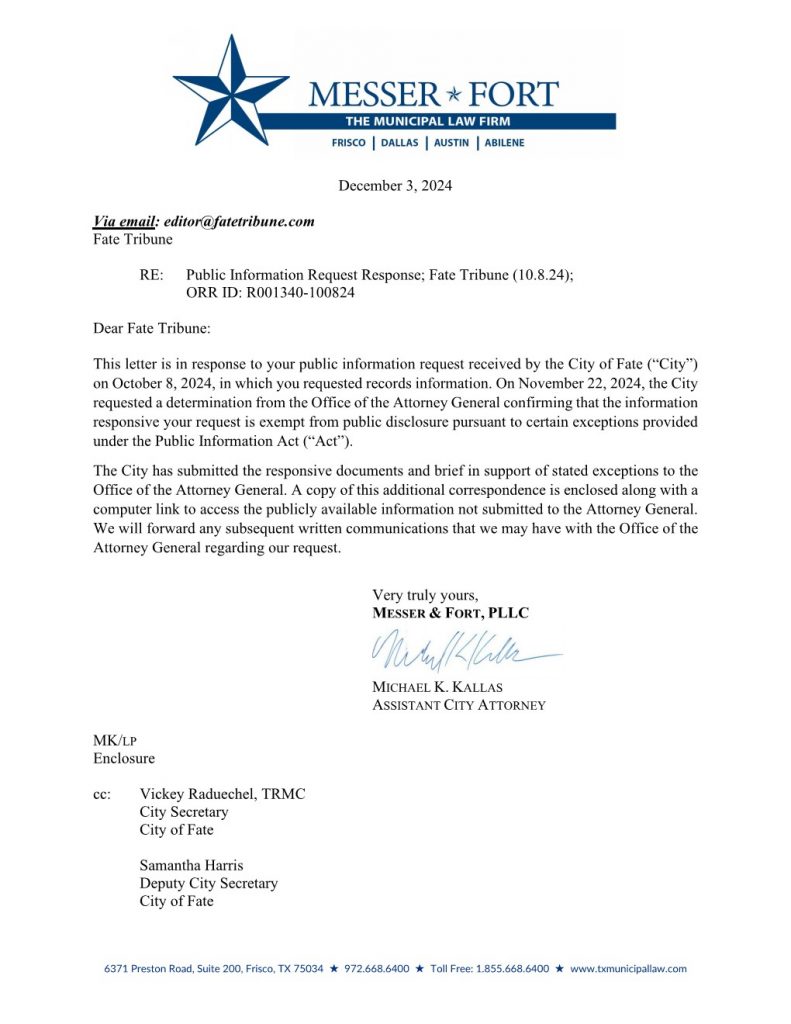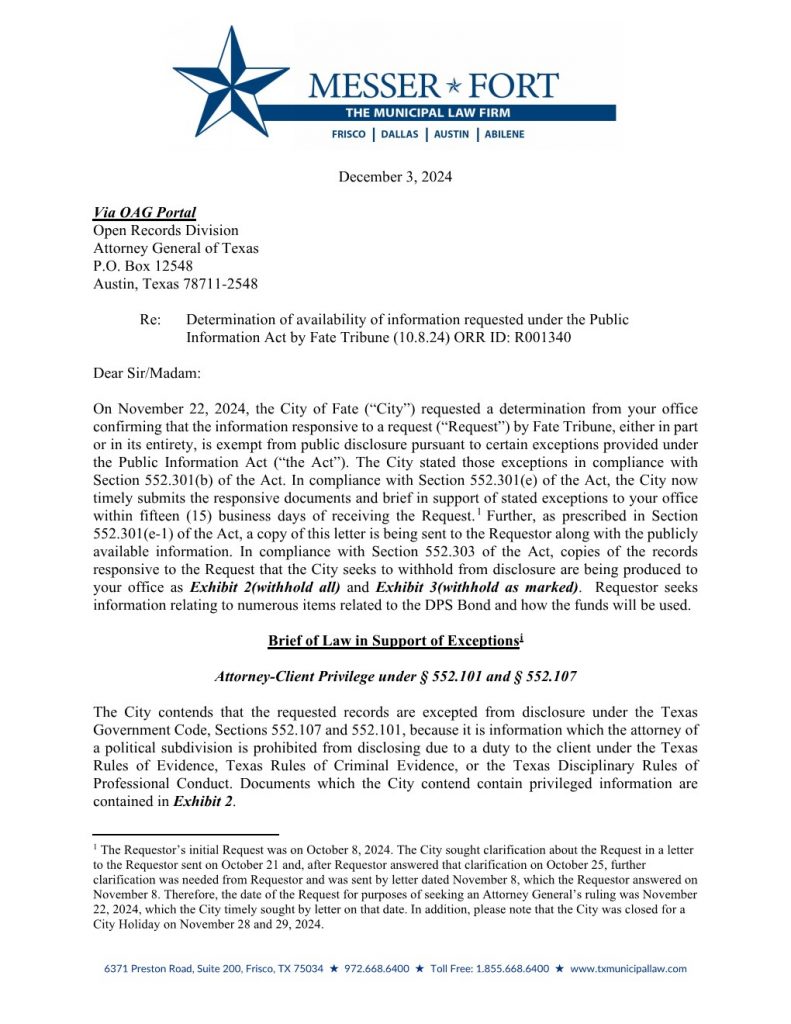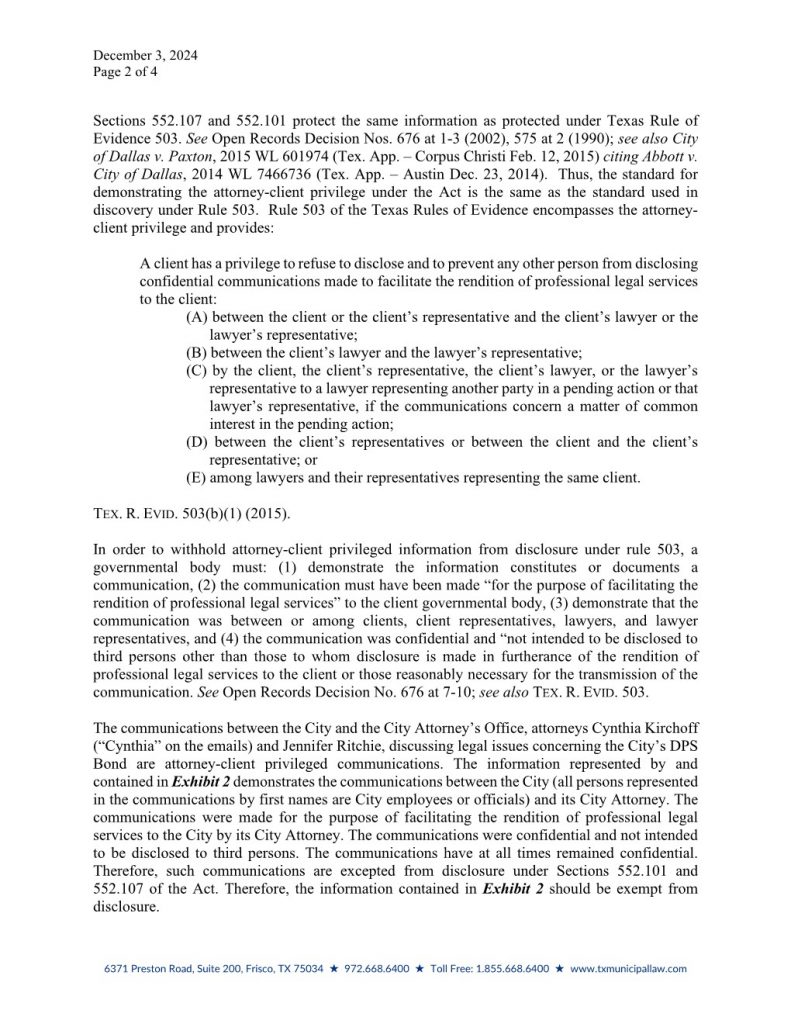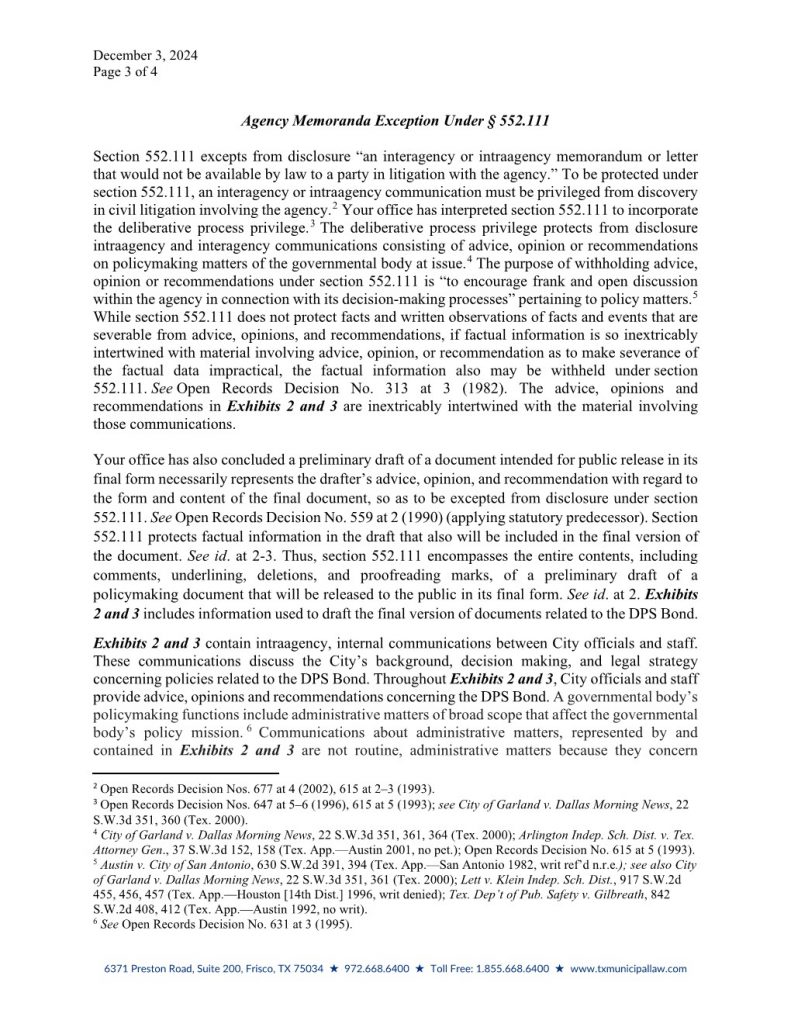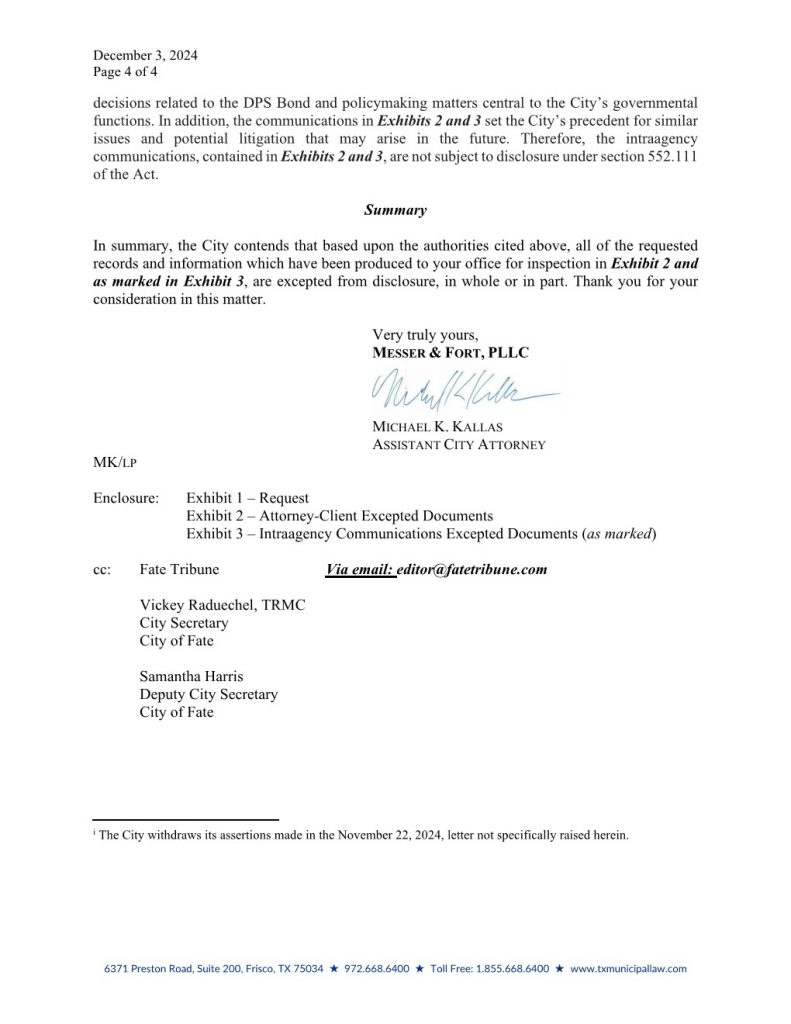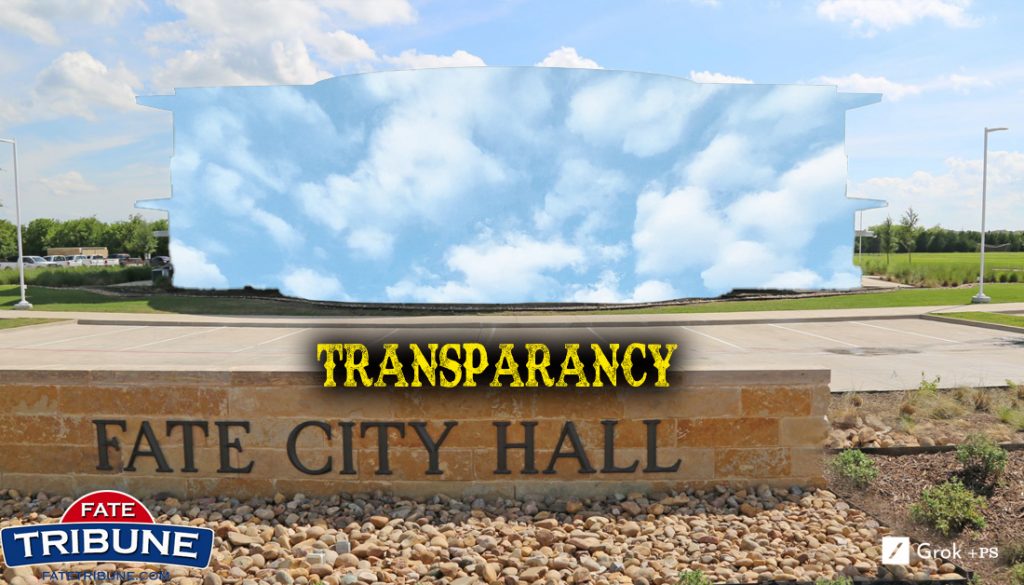Fate, TX – In the wake of the November 2024 election, where voters approved the City of Fate’s Department of Public Safety (DPS) bond initiative of $20,000,000.00, the Fate Tribune continues to face roadblocks in its quest for transparency regarding the bond’s development and internal discussions. The Tribune’s Open Records Request (ORR) for communications about the bond has been met with stiff resistance from the City’s legal representatives, who have withheld documents under the pretext of attorney-client privilege.
The City, represented by Michael Kallas of Messer & Fort, PLLC, claims that nearly all communications related to the bond initiative are exempt from disclosure under the Texas Government Code. However, the Tribune argues that this sweeping use of exemptions not only undermines the public’s right to know but also fails to meet the legal standards for confidentiality. The full response submitted by the Fate Tribune to the Texas Attorney General is included below, outlining their case for public access to these critical records.
The City’s Claim of Privilege
In a letter dated December 3, 2024, Assistant City Attorney Michael Kallas confirmed that the City requested a determination from the Texas Attorney General’s Office to withhold documents responsive to the ORR. The City argues that these records fall under attorney-client privilege and are therefore exempt from public disclosure under Section 552.107 of the Texas Government Code.
However, the Tribune’s initial review of the heavily redacted records provided by the City reveals that many communications do not involve legal counsel. Instead, emails between city employees and council members, in which legal representation was neither a participant nor copied, were also withheld under the same claim of privilege. This blanket redaction raises serious questions about the legitimacy of the City’s argument.
The Fate Tribune’s Response to the Attorney General
Yesterday, the Fate Tribune filed its formal response to the Attorney General of Texas, contesting the City’s reliance on attorney-client privilege. Editor Michael E. Pipkins argued the following points:
- Attorney-Client Privilege Requires Strict Confidentiality
For communications to qualify for attorney-client privilege, they must remain confidential and involve only privileged parties. The City appears to have included individuals outside the scope of this relationship in their correspondence, breaking the chain of confidentiality and invalidating the claim of privilege. - Waiver of Privilege Through Dissemination
The inclusion of non-privileged individuals, such as certain city employees, in these communications constitutes a waiver of attorney-client privilege under Texas law. Without maintaining strict confidentiality, the City cannot rely on this exemption to withhold records. - The Public’s Right to Know
Public safety bonds involve taxpayer dollars and long-term financial obligations that demand accountability and transparency. The improper withholding of records undermines public trust and the democratic process.
The full text of the Fate Tribune’s response is as follows:
To: The Honorable Attorney General of Texas
The Fate Tribune respectfully submits this response in regard to the City of Fate’s request for exemption under Texas law, citing attorney-client privilege to withhold certain documents related to a bond proposal for the Department of Public Safety. Our position is that the City has failed to maintain the confidentiality necessary for the privilege to apply and thus cannot justify withholding these records from public scrutiny.
Summary of the Issue
The City of Fate received an Open Records Request (ORR) from the Fate Tribune seeking communications related to the proposed bond. While some records were provided, they were heavily redacted. Additionally, the City notified us of its intent to request an exemption from the Attorney General’s Office to withhold other documents under the attorney-client privilege exemption in the Texas Public Information Act (TPIA), codified in Texas Government Code §552.107.
However, based on the limited but redacted records we received, it is apparent that the City included individuals who are not direct participants in the attorney-client relationship in their communications. This undermines the privilege and renders the exemption inapplicable.
Legal Argument
- Attorney-Client Privilege Requires Strict Confidentiality
Under Texas Government Code §552.107, communications may be withheld if they constitute confidential attorney-client communications. For this privilege to apply, the communication must:- Be made between privileged parties (e.g., the attorney and client or their agents acting within the scope of the privilege).
- Be intended to remain confidential.
- The City’s Actions Demonstrate a Waiver of Privilege
A review of the redacted documents reveals that communications involving the City’s legal counsel were disseminated to parties who are not privileged participants, including city employees and possibly third parties whose roles do not establish them as agents within the attorney-client relationship. This dissemination breaks the chain of confidentiality and constitutes a waiver of the privilege.Texas courts consistently hold that the privilege is lost when a client voluntarily discloses the content of the communication to a third party, even if those individuals work for the client organization. To preserve the privilege within an organizational setting, the individuals involved must have a direct need to know the legal advice provided. Based on our examination, it appears that the City did not adhere to this standard. - The Public’s Right to Know Outweighs Improper Claims of Privilege
The TPIA presumes that government information is open to the public unless an applicable exemption applies. In cases involving public bonds, transparency is paramount, as such measures involve taxpayer funds and long-term obligations affecting the entire community. Improper withholding of information undermines public trust and the democratic process.If the City included unprivileged parties in its communications, its claim of exemption is not only legally deficient but also contrary to the spirit of transparency that underpins the TPIA.
Request for Relief
Given these facts, the Fate Tribune respectfully requests that the Office of the Attorney General deny the City of Fate’s request for exemption and compel the City to release the requested documents in their entirety.
Transparency in government is a cornerstone of our democracy, and the citizens of Fate deserve to understand the full context and rationale behind decisions regarding a public safety bond proposal.
Respectfully submitted,
Michael E. Pipkins
Editor, Fate Tribune
The Fight for Transparency
The Fate Tribune remains committed to holding the City of Fate accountable and ensuring that taxpayers have access to the information they are entitled to under the law. The outcome of this dispute will set a critical precedent for transparency in local government as cities across Texas grapple with similar issues of public trust.
The Tribune will continue to provide updates as the Attorney General evaluates the City’s request.
Letter from City Attorney to the Texas Attorney General
